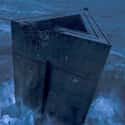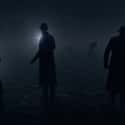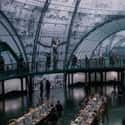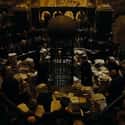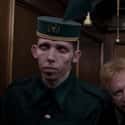-
(#1) The Ministry Didn't Construct Azkaban - It Discovered The Wizarding Prison
Casual fans of the Harry Potter franchise may not realize that the Ministry of Magic had nothing to do with the formation of Azkaban. The Dementor-filled wizard prison in the North Sea was initially built as a trap to lure Muggle sailors to its rocks (and their deaths) by a wizard named Ekrizdis.
The fortress was shrouded by concealment charms, but after Ekrizdis passed, his magic faded and left the fortress out in the open for the first time. Members of the Ministry of Magic investigated the building and found a nest of Dementors (among other terrifying sights). Rather than destroy Azkaban outright, the Ministry decided to make use of it.
In 1718, the island was finally put to use as a magical prison where the inhabitants were drained of their life force by the on-site Dementors. It held its place for generations until the Second Wizarding War.
-
(#2) The Minister For Magic Banned Wizards From Taking Part In WWI
On numerous occasions, the Minister for Magic has prohibited the wizarding community in Great Britain from lending a helping hand to Muggles. Minister Archer Evermonde, for example, strictly stated that no wizard could involve themselves in WWI, despite that's conflict's horrific circumstances.
Some wizards, however, made their way to the Muggle world to fight alongside the Allied forces.
-
(#3) The Ministry Controlled Dementors For Hundreds Of Years
After the discovery of Azkaban Prison, the Ministry of Magic had a major problem on its hands: what to do with all the Dementors there.
Rather than set them free on the wizarding world, Minister for Magic Damocles Rowle suggested using the Dementors as a tool for law enforcement. Rather than hiring guards to staff the wizard prison, Rowle figured it would make the most sense to just use the Dementors to make sure that no one could escape.
His arrangement with the Dementors meant they could feed as much as they want as long as they kept wizards from escaping. His deal worked and the prison had an incredibly low rate of escape.
-
(#4) The Department Of Mysteries Is Older Than The Ministry Of Magic
The Ministry of Magic's Department of Mysteries, established in the 17th century, has been part of the wizarding world for longer than the Ministry itself (which was established in 1707). The autonomous department, which doesn't report to the Department of Magical Law Enforcement like other Ministry subdivisions, has an opaque purpose. According to the former Pottermore site, "The Department of Mysteries is, unsurprisingly, pretty damn mysterious: a top-secret Ministry of Magic department dedicated to the queries of creation, to the study of life, magic, and death."
The confidential research carried out by this group, whose members are known as "Unspeakables," is known to few in the wizarding world. It's believed that whatever they're doing - whether it's studying death, time, or space - is important, so they're mostly left to themselves.
-
(#5) Aurors Are More Like MI6 Or CIA Operatives Than Detectives
Throughout the series, Harry and Ron talk about what they want to be when they grow up: Aurors, like Alistor "Mad-Eye" Moody, Kingsley Shacklebolt, and Nymphadora Tonks. But what exactly is an Auror? The brief glimpses movie viewers get of this profession make Aurors look like wizard cops, but they're actually closer to British MI5/MI6 or United States CIA/FBI agents than pavement-pounding detectives.
To become an Auror, applicants need a minimum of five NEWTs (Nastily Exhausting Wizarding Tests) with solid marks, and a positive write-up on "a series of character and aptitude tests." This is similar to what MI5/M16 or CIA and FBI agents have to go through today, although there are security clearances involved for Muggles that don't seem to have a parallel in the wizarding world.
-
(#6) The Ministry Covers All Costs Of Attending Hogwarts
Attending Hogwarts is expensive, requiring supplies like books, wands, and robes. Tuition, according to estimates based on tuition costs for the best boarding schools in England, would be about $41,000. It makes sense that the cost of attending one of the most prestigious schools of the wizarding world would be expensive, but its overwhelming price means many wizarding children would be left out.
It turns out that whether you're a Weasley or a Malfoy, you don't have to pay for school at Hogwarts because the Ministry of Magic takes care of it. Author J.K. Rowling explained this deal of a lifetime on Twitter:
@emmalineonline1 @micnews There's no tuition fee! The Ministry of Magic covers the cost of all magical education!
— J.K. Rowling (@jk_rowling) July 17, 2015 -
(#7) The Ministry Communicates News To The Muggle Prime Minister Through An Enchanted Painting
When it comes to communication between the Minister for Magic and the UK prime minister (their equivalent in the Muggle world), chitchat and diplomatic photo opportunities are out, but the two do meet under important or troubling circumstances. Each new British prime minister learns about the wizarding world after a visit from the Minister for Magic, who explains that if the Ministry needs to reach out to them with important news, they will.
Communication takes place through a portrait of Ulick Gamp, the first Minister for Magic, that's stuck to the wall of the prime minister's Downing Street office with a Permanent Sticking Charm. If the Minister for Magic needs to tell the prime minister something, the painting's subject makes an announcement and the Minister for Magic pops into the prime minister's office. For example, when Voldemort and his followers return to wreak havoc in both the Muggle and wizarding world, Rufus Scrimgeour visits the prime minister to explain what is happening.
No prime minister has ever paid a visit to the Ministry of Magic, however, simply because the prime minister probably just couldn't handle it.
-
(#8) There Are Ministries Of Magic Across The World
More often than not, when someone in the Harry Potter series is speaking about the Ministry of Magic, they're talking about the British Ministry, but that's just one of many ministries throughout the wizarding world. Just as there are multiple schools for young wizards in different countries and communities, many ministries exist, as well.
Europe and Asia have the largest number of ministries, at nine and seven, respectively. Africa, Oceania, and South America each have one. In North America, the only known magical government body is the Magical Congress of the United States of America (MACUSA). One of the oldest ministries is the Japanese Ministry, which has been around since at least the 17th century.
-
(#9) The Minister For Magic Is A Democratically Elected Position (Most Of The Time)
In a world where an enchanted hat sorts students into their Hogwarts houses and a magic goblet chooses participants in a dangerous Tri-Wizard Tournament, it might be surprising to learn that the Minister for Magic is chosen democratically more often than not. Ulick Gamp, Chief Warlock of the Wizengamot before the Ministry was founded, became the first Minister for Magic in 1707. He served until 1718, when elections for the position began.
Ministers for Magic must serve for at least seven years and there are no term limits. The rare cases when a vote isn't taken are times of great stress on the wizarding world, which is why Dumbledore received multiple offers through the late '80s and in 1990. Usually, when a Minister gets the job, they keep it until they're tired of the rigors of the position.
-
(#10) Nearly Every Other Department Answers To The Department Of Magical Law Enforcement
Seven departments exist within the Ministry of Magic: Magical Law Enforcement, Magical Accidents and Catastrophes, Regulation and Control of Magical Creatures, International Magical Cooperation, Magical Transportation, Magical Games and Sports, and Department of Mysteries.
Although they're mostly autonomous, all except the Department of Mysteries answer to the large Department of Magical Law Enforcement, which also polices the outside wizarding world. As with many bureacracies, each department has numerous sub-offices.
-
(#11) The Ministry Set The First Official Rules For Quidditch In 1750
Before Quidditch became the No. 1 sport in the wizarding world, a series of similar games fed into its creation. The sport's creators cribbed from numerous local broom-based events to build their version.
Even though Muggle sporting leagues have their own overseers, the official rules of Quidditch were set by the Ministry of Magic in 1750. Once the sport went international, the British Ministry removed itself from overseeing the sport and left its governing up to the International Confederation of Wizards Quidditch Committee.
Even though the rules are out of the hands of the British Ministry in the modern era, it's interesting to note that very little about the basics of the game have changed since the 18th century.
-
(#12) The Ministry Is Completely Underground, But It Has Magical Windows That Display Preplanned Weather
The Ministry's massive complex is entirely underground, which makes sense because it's magic and Muggles aren't supposed to see or know about it. However, while the whole building is beneath the streets of London, the people working inside still want to take a break and stare out a window.
The building is outfitted with windows that show weather chosen by Magical Maintenance. It's unclear if the weather matches what's happening outside, or just the vibe of the worker who sets up the windows, but the windows can feature anything from a nasty rainstorm to a sunny day.
-
(#13) Albus Dumbledore Repeatedly Turned Down The Minister For Magic Position
The Minster for Magic in Harry Potter is kind of like the wizarding equivalent of a British prime minister. Hogwarts Headmaster Albus Dumbledore, who was an exceptional student and leader at school and in the years beyond, seemed like a natural candidate for a higher wizarding office. Although he was offered the position of Minister for Magic multiple times, Dumbledore turned it down because he didn't believe he should be given that much power.
At Hogwarts, he was able to mentor and guide Harry, but it's likely that if he had accepted the minister position instead of Cornelius Fudge during the time period covered in the series, the latter's massive ball-drop on the whole Voldemort thing might not have happened. Dumbledore still willingly helped the Ministry of Magic whenever he was asked, but it's interesting to think about the possibilities if he had been in charge of more than just Hogwarts.
-
(#14) Ministry Departments Communicate Via Enchanted Paper Airplanes Because Owls Poop Too Much
In the modern office, magical or otherwise, bird waste is not welcome. Rather than use a complex phone system, inter-office envelopes, or an enchanted wizards' version of Slack, the Ministry sends out its interdepartmental memos on pale-violet paper airplanes.
Before the paper missives, everyone in the Ministry used owls to send their messages. Unfortunately, the owls were incredibly messy. They left feathers and droppings all over the building, which must have been a pain for the custodians, even if they could use magic to clean it up.
New Random Displays Display All By Ranking
About This Tool
Our data comes from Ranker, If you want to participate in the ranking of items displayed on this page, please click here.

